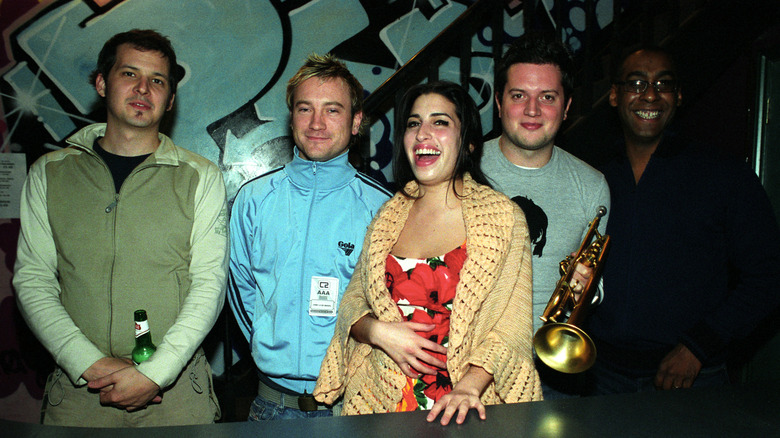What Amy Winehouse's Former Bandmates Have Said About Her
Amy Winehouse, the Grammy-Award-winning British singer who combined a variety of musical styles with her honest lyrics about love and addiction in songs like "Rehab," became tabloid fodder before her tragic death at 27 from alcohol poisoning. But in numerous interviews with her bandmates, it's not her often messy public persona that comes to the fore but her deep love of music. "She always said that had she not become a huge star, she'd still do it anyway," Hawi Gondwe, her guitarist, told Retrospective Live. "It was all about getting the music across for her."
Winehouse's addiction issues eventually impacted her musical career towards the end of her short life. Dale Davis, her bassist and musical director, called her "brilliant" but admitted "things got more erratic when 'Back To Black' came out and things started to change" (via Rolling Stone U.K.). He performed with her during her last gig, in June 2011, in Belgrade, Serbia. The show was marred by Winehouse's inebriation and inability to perform. "As a musician, it remains the most difficult night I've ever had," he said.
Winehouse's bandmates found her easy going
In the recording studio and on the road Amy Winehouse maintained a laid-back style as a band leader and allowed her fellow musicians leeway to explore their sound, according to her former bandmates. "There was always a nod and a wink or a giggle and a smile if she liked something you did," her first saxophonist Jim Hunt told Retrospective Live. "And if she didn't, you'd know."
During the recording of Amy Winehouse's final record before she died, "Back to Black," saxophonist Neal Sugerman, who worked on the album and toured with her in the U.S., found Winehouse the antithesis of a diva. "She was a great musician and really open," Sugerman told the BBC in July 2011. "She was really into collaborating with the band and never came off as being bull-headed in any way." He believes that she never wanted to be a star and that fame "haunted" her since "she really liked being with people one-to-one, especially with musicians."
Winehouse nurtured her bandmates
Other overlooked aspects of Amy Winehouse's personality were her willingness to nurture her bandmates' talents and her fierce sense of loyalty. Nathan Allen, her drummer, called Winehouse "a mother figure ... She always wanted to make sure everyone was doing okay. She was very loving." Dale Davis recalled that if the singer clicked with someone, it was for good. "If she liked you, she really liked you," he told The Sun. "If she loved you, she loved you hard. She was a warm, beautiful, generous person who made me feel special right from the off."
For Zalon Thompson (his stage name is simply Zalon) who was Winehouse's backup singer, she not only attempted to further his solo career by signing him to her label, she also gave the British singer-songwriter the advice he needed to find his own unique sound. "Amy said, 'Look, like, basically find your truth'," Zalon told Channels Television.
Winehouse had a great sense of humor
Not only was Amy Winehouse easygoing with and nurturing towards her bandmates, the singer also had a wicked sense of humor and a lighthearted sensibility. Saxophonist Jim Hunt called being in a band with her "a happy ship" and believed that Winehouse "looked after" them. Bassist Dale Davis recalled that they spent a lot of time cutting up when not recording or performing. "She had great observational humor ... and was very, very quick with it," Davis said during the Retrospective Live interview. "She was very silly, very jokey. We had a lot of laughs with her."
Davis expanded on this during his interview with The Sun. "People didn't always see it but she was very bright and her observational humor was incredible," he said. "She'd see something funny long before anyone else." Relatedly, he said Winehouse was very intuitive. "She was also a very spiritual person and had more insight than most people are blessed with," Davis recalled.
Winehouse had a deep respect for jazz
Amy Winehouse had a deep respect for jazz and soul and thrived off of improvisation during performances, her bandmates recalled. Among Winehouse's musical idols were soul singer Donny Hathaway and jazz great Dinah Washington, according to her guitarist Hawi Gondwe.
She also allowed the band freedom to express themselves within the "jazz context" of the music, Nathan Allen, her drummer, recalled. "Every show was different even though we were playing the same songs," he told Retrospective Live. "She wouldn't sing it the same and the band wouldn't play it the same." Dale Davis believed Winehouse's spontaneity while performing ultimately wore her down. "After four nights of singing the same song, she would introduce new melodies and change things around so everything was different," he told NME. "That ended up being one of her downfalls because she improvised every night and gave so much performing that it left her tired."
Winehouse didn't think she'd make 28
In the last few days of Amy Winehouse's life, she continued to struggle with her sobriety. This was nothing new to her bandmates. "I was out with her two nights beforehand," Dale Davis told The Sun. "And she used to ring my house regularly around that time to speak to my wife (now ex-wife) and son. However, she did tell my ex that she didn't think she'd see 28." Neal Sugerman recalled seeing her not long before her death and told the BBC "it was not a pretty sight. It was real depressing. We cut something that she wasn't able to sing on, which was a real drag."
Among Amy Winehouse's tragic final words were that she "didn't want to die," which she tearfully told her general practitioner, Dr. Christina Romete, who had checked in on the singer at her home the evening before her heartbreaking end. Winehouse's security guard found her dead the next day, July 23, 2011. Although she's been dead for more than a decade, Davis believes her music will continue to inspire. "Her spirit was so strong that she's going to touch people forever, really," he said.
If you or anyone you know needs help with addiction issues, help is available. Visit the Substance Abuse and Mental Health Services Administration website or contact SAMHSA's National Helpline at 1-800-662-HELP (4357).





